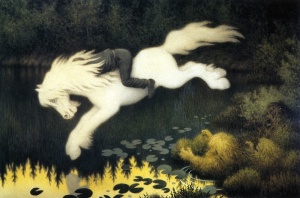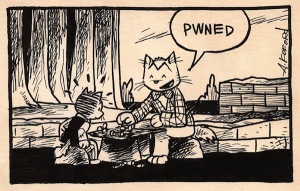Nathan Hill: Unpuzzling it all
by Mark Reynolds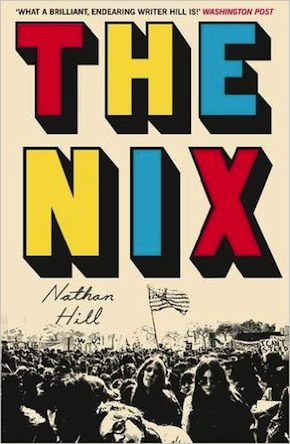
“The best new writer of fiction in America. The best.” John Irving
Nathan Hill’s debut novel The Nix is a hefty, engrossing, deeply funny family drama and a sweeping examination of American politics, protest and the shifting media landscape over the last fifty years. At its centre is Samuel Anderson, a blocked writer, bored teacher and online gamer, whose mother Faye walked out decades ago and re-enters his life after she’s filmed throwing rocks at a populist presidential candidate. I chat to him about truth and fiction, obsessive gaming, a forthcoming adaptation starring Meryl Streep, and endorsement from one of his literary heroes.
MR: So what is a nix, and at what point did this present itself as the title of the book?
NH: The funny thing is that it had a different title for ten years. The first thing I wrote for the book was the sentence: “There’s a body for each of us.” It was about an anti-war march in New York in 2004 where there were all these coffins made of cardboard with American flags draped over them, symbolising the Iraq War dead. A Body for Each of Us was the title of the book until literally the day before my agent sent it out to publishers. We changed it because the book had shifted underneath me during the ten years it took to write, though it remains as the title of one of the sections.
The Nix became the title because it seemed to work thematically with what was going on in the rest of the book. A nix is a Scandinavian ghost from folk tales, and it’s usually depicted as a water spirit, an ugly troll-type thing, but it’s a shape-shifter too and sometimes it’ll appear to children out walking alone as a beautiful white horse and tempt them to climb aboard – and if they do it’ll run them into the water and drown them. I guess it’s a story about not trusting things that are too good to be true, but the moral seemed a little bit different to me. When it first appeared to the children it must have been the greatest thing that ever happened to them, and so the moral seemed to me, as I write in the book, to be that the things you love the most will one day hurt you the worst, which was something that was happening to a lot of the characters. Samuel is abandoned by his mom, the woman who means the most to him; there a character, Bethany, who is disowned by her twin brother; another, Henry, is swindled by the company he’s working for; Pwnage, the video gamer, is undermined by the video game he’s obsessed with. It happens to everybody.
What drew you to those folk tales?
My family on my mom’s side is from Norway, they emigrated to the US several generations ago. They first moved to a small town in Minnesota, and then eventually to a small town in eastern Iowa on the Mississippi River, where my mom grew up, and that’s where they all are still. We don’t really have any connection to the family back in Norway, we don’t know anything about them. The only information I have is something my mom heard her grandmother say, that my great, great grandfather came from Hammerfest. That’s it. So Hammerfest makes it into the book, and it was sort of a way for me to write a family history when I don’t actually have one, like fill in the blanks.
Did you go out to Hammerfest to research that chapter?
I’ve been to Oslo but I haven’t been to Hammerfest. I’m dying to, but it’s quite remote. You can ‘walk’ the entire town on Google Street View, so I did that to capture it in the book. I’m sure once I finally do go I’ll realise the ways in which I screwed up my description, but I did the best I could.
I didn’t set out to write a book that contained so many multitudes, but that’s where it ended up.”
This is a book about politics, activism, academia, 1960s counterculture, online gaming, mediated communication, family history and dysfunction at all levels of society. What was the starting point, and how did all these strands accumulate and finally fit together?
Very, very slowly and over a long period of time. The starting point was I had an idea about writing about two generations of protests: a mother at the 1968 protests, and her son at the 2004 protest. I’d just moved to New York City in August 2004, and I watched all the demonstrations, and when I began writing something new that’s where I turned to. One of the things people were saying on the cable news shows before the event was if what happened in Chicago in 1968 happens again, then what’s that going to mean for the election? I had no idea what really went on in Chicago in 1968, so I started looking into it and it seemed very prescient about the currents that were happening in American politics, so I started writing about it.
The other things you mentioned I guess came about because every once in a while I’d have a new idea that I thought would be thematically resonant and try and put it into the book and the book seemed to contain it, to accept it. And through a period of years, after many very small decisions, it just got to be what it is. I didn’t set out to write a book that contained so many multitudes, but that’s where it ended up.
Did have any idea it would end up at 620 pages?
No, when I’d finally figured out the map for the book, I really thought it was a 300-page, 400-page book, but then I went about writing it and the story took me to places and I wanted to follow it. When I finished the first draft it was actually 1,002 pages long, and a lot of that material needed to go away: subplots that didn’t go anywhere, ideas that were interesting but weren’t necessarily relevant to the other things happening in the book. And there was a lot of what I call ‘throat clearing’, you know, stuff I would write that would help me get to the good stuff. So all of that needed to go away too. The first big revision took a full year, and then another year was spent revising with my agent and then my editor, so about two, two-and-a-half years total of getting rid of that material and trying to polish what was left and get it as tight as possible. It’s a long book, but I was hoping it didn’t read like a long book.
What is your relationship with online gaming? Have you given it up altogether?
I have, yeah. Do you know the story about how I got into it? I moved to New York City right after grad school, and in my first month in the city I was moving from a temporary sublet to a permanent apartment but I had this awkward day where I had to store everything in my car because I had to be out of the sublet in the morning but I couldn’t move into the apartment until the evening. So everything was in my car, and I went into the city to go to work and I came back home and the car was empty. Everything had been stolen: my books, my clothes and the computer on which I’d written everything in grad school, three years of writing, a book in progress, all of it was gone. Then a friend of mine told me, “Go buy this video game, it’s called World of Warcraft, we’re going to play it together.” He did that, he said later, so he could keep an eye on me, make sure I was OK; we could chat while we played together online. And we did that together for about six or eight months, and then he got bored with the game and I didn’t. I really got into it, I really loved it, and I kept playing – a lot – and ending up becoming a regular raider. I joined a guild and we would conquer the very highest level, I was spending a lot of time with the game. Looking back on it, I think I was doing that because so many other things in my life were out of control. All of my things were stolen, my writing was going nowhere, I was working for a poetry non-profit, so you can imagine what my salary was, so living in New York I was barely staying afloat. But at least I could go to this game and be really good at it, and feel good about that sense of accomplishment. It was helpful, it got me through a dark time.
But then, fast-forward about three years and I realise I’m spending way more time on this video game than I am on my writing, it was taking me away from my real life. So I quit, cold turkey, and haven’t really played since. But I thought it was a good thing to put in the book, because I had this kind of love-hate relationship with it. I appreciated it for what it did for me during a sad time, but I really it for how much time it took from real life.
The real positive that comes out of the episode of Pwnage’s struggle to quit gaming is the support network of the guild, and how they rally to save him.
Right, and I witnessed that. The people you’re in a guild with, you may never meet them face-to-face but you’re with their voices several nights a week and you get to know them in this very strange way, you build friendships. I met some extraordinary people that I played with: soldiers in Baghdad who would play Warcraft the way maybe previous generations of soldiers played pool; I met a grandmother who played because she lived far away from her grandchildren, so this was how they connected, and she ended up being better than her grandchildren at it. A lot of really interesting people play that game.
In your teaching career, have you met kids who are as needy, lazy and self-obsessed as Samuel’s worst student Laura Pottsdam?
Not all those at once. Laura is maybe an amalgam of some of my most challenging experiences as a teacher, but people have asked me if there are Laura Pottsdams out there and the answer is yes. I should say most students are hardworking and wonderful, and I really enjoyed my time teaching, but there wasn’t a semester that went by when I didn’t catch somebody plagiarising something from the internet, or get appeals for extra credit when somebody hadn’t done any of the work. All my friends who taught also had these stories, and we were beginning to think that something was very wrong, like generationally wrong. My own theory about this is that these are kids that grew up during a recession, where they had well-meaning people give them bad advice and see college as a very utilitarian thing. They need to get the degree, and in order to get the degree they have to finish x number of tasks. If you’re coming at it from that direction, whether you’re doing the work or plagiarising doesn’t really matter as long as the task is completed. Like most teachers I really believe in antique ideas about a well-rounded, liberal education where you’re not going to college to get job skills, but to learn how to learn.
If we fill up all our micro-moments with these distractions, we’re losing that ability to be still, to daydream, to be creative.”
I loved Laura’s iFeel social media app, with its choices of Ignore, Respond or Autocare – by which the app randomly expresses your mood when you’re too lazy to post. Have the Information Age and all its gadgets made us numb to the stuff that really matters?
Maybe not numb, but it might make it more difficult to figure out what does matter. One of the things I told my students was that one of the worst things you can do for your mind once you leave a class is to check your phone right away. There’s a lot of really good neurobiology research showing that in order to encode memory from short-term into long-term, you have to give your brain some downtime, you have to be consciously bored. And against that we have a tech culture that is trying to fill up all our micro-moments. You have video games on your phone that are intended to last fifteen seconds, and that’s a disaster. If we fill up all our micro-moments with these distractions, we’re losing that ability to be still, to daydream, to be creative and thereby to remember, and also to realise what’s important and what’s not.
Samuel’s first attempt at fiction as a kid is a derivative Choose Your Own Adventure story, which I understand is a direct lift from your own life.
Yeah, and the book he writes and wins a class prize for is a very faithful description of the book that I wrote and won a class prize for when I was about the same age. I wrote a Choose Your Own Adventure story called The Castle of No Return that I illustrated myself, and it wasn’t a great plot, it didn’t provide very interesting choices. You know: “Do you want to go left or do you want to go right?” And if you go left, you die. I found it recently. I was going through my parents’ boxes of all my old stuff, so now I have it. I’ll put it in my website or something. It was my first literary prize and my teacher read it in front of the class. The writing is really bad although, as I write in The Nix, I was impressed with my ability to kill characters creatively: alligator robots with guns on their faces, things like that.
Pwnage says: “Any problem you face in a video game or in life is one of four things: an enemy, obstacle, puzzle, or trap.” Is a puzzle the only one that can have a positive outcome?
It seemed that way to me. I encountered that in a book for programmers and game designers, and it just struck me that it could be a life philosophy. And I guess I make the argument at the end that it’s maybe best, or at least it makes your life less toxic, if you imagine people as puzzles and not as enemies. I guess we saw very clearly in our last election that it’s very easy to think of people with whom we disagree strictly as enemies, and if we stop there then we’re missing the mystery and the humanity underneath. Imagining them as puzzles may be harder work, but it fills your life a little bit more.
The media manipulator Periwinkle’s philosophy is summed up in his observations that “it’s okay to be the horrible person you already are,” and that “the only people who get famous on their own are serial killers. Everyone else needs people like me.” Is Periwinkle a puzzle? Does he have any redeeming features?
I think so. I think Periwinkle reflects a pretty common human trait, which is that it’s very easy for us to start valuing or favouring the things that we’re successful at. What he’s really good at is holding opinion and creating the narrative, creating image, and so it didn’t strike me as too far of a leap to think that a person who’s rewarded for that would eventually be this kind of master media guru, and be able to justify it in his own head. I don’t really go into that in the book, but I do feel there’s probably a real human story there.
Why did you throw Allen Ginsberg in amongst all your fictional characters?
Two reasons, I guess. It’s easy to think of Allen Ginsberg as a kind of rabble-rouser, a provocateur. But in ’68 in Chicago he was really a peacemaker. He was trying to get people to meditate and calm down. You had these hot-headed youths rushing into the protest, and he was the voice of calm and reason, and I like that counterbalance. Then secondarily, just for plot reasons, I knew that Faye was interested in literature and the arts, and so if I have her get interested in Allen Ginsberg then I give her a reason to go to Chicago to study with him. So he ended up being a nice plot device as well as an evocative historical figure.
The chapter where Pwnage shuts down could be described as a kind of stream of impending unconsciousness. Just how many words are in that single sentence, and why did that feel like the best way to express his seizure?
I don’t know how many words are in it, but it’s like ten, eleven pages. In the first draft, I was writing it as a list of every reason I could think of that he would tell himself he couldn’t stop playing video games, all the excuses. I was reading it to my wife because I was sort of proud of it, and she said, “Is this all one sentence?” And I started thinking I guess it could be. What would it feel like to him that he’s giving up this one thing that brings him social affirmation, the one thing he feels successful at? It would feel like the walls were closing in. And also the feeling that I had when I’d sit down and play Warcraft, where suddenly five hours would have gone away, and you really had a sense of time passing you by. So I thought if I did it all in one sentence I can maybe capture that rush of time, and the claustrophobia he must be feeling, and hopefully the anxiety a reader will feel waiting for that period would mimic the anxiety that Pwnage is feeling.
As Faye’s uncles watch live news coverage of the police attacking the women protesters in Chicago you comment: “This right here is the future of television: pure combative sensation.” And in the same chapter you have Walter Cronkite shuddering at a vision of manipulative politicians of the future. It feels partly like you’re writing that from right now, but it also throws up the fact that some of the cynicism and sneakier elements of today’s society were very much in place all that time ago.
Yeah, I don’t know if that’s quite how they thought about it in ’68, that is obviously a very contemporary way of looking at it, and really the only reason the uncles and Cronkite are in there is so I can talk about image and spectacle. So I’m not writing a historical truth right there, the uncles are like proto-Fox News viewers.
It’s almost laughable to think that these kind of free-love Yippies would be on the same side as, say, a plumbers’ union. But they really thought they were fighting the same fight.”
But those protesters were pretty media-savvy, weren’t they?
They were in that they knew how to get into the papers, they were very good at that, but the other true thing is that the only thing less popular at that time than the Vietnam War were the Vietnam War protesters. As one of those protesters told me when I was doing my research, they thought they were changing the world but then they got Nixon elected. So they were media-savvy but they really turned certain people off. You read the writing of the time and you see that a lot of these organisers thought they would be able to get unions and blue-collar workers on their side, they would be able to get the black community on their side, and neither of those crowds really showed up, and it’s almost laughable to think that these kind of free-love Yippies would be on the same side as, say, a plumbers’ union. But they really thought they were fighting the same fight, and in some ways that shows how disconnected they were from the rest of American society.
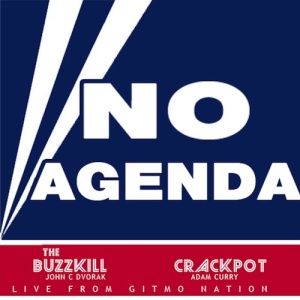
No Agenda episode 737 artwork by Pay (after Fox News). Wikimedia Commons
Towards the end of the book, Periwinkle says: “We are more politically fanatical than ever before… nobody cares about antique ideas like true or false.” That could have been written this week…
Since the election we have a new way of talking about it: ‘fake news’ or ‘alternate facts’, but when I was writing that passage three or four years ago, what was obvious even then was that the two sides on the political spectrum have a radically different way of describing the world. I live in a beautiful little beach community but it’s also quite conservative, it’s I think 70 per cent Republican, so a lot of the guys that I play sports with are Trump supporters, and sometimes we talk politics – mostly we talk tennis, but sometimes we talk politics – and I try to listen as best I can, and I realised years ago that the way they describe the world bore no resemblance to the way I described the world. They would say, “Obama’s given away the country to immigrants,” and I would think, where is the evidence for that? And then when I’d argue, they’d just say, “You’re misinformed.” So they thought I was misinformed by propaganda, I thought they were misinformed by propaganda, and between those two positions there’s no discussion.
Which contemporary politician would you most vehemently urge your mom to throw rocks at?
Ha! I would not urge anyone to throw rocks at anybody. Not a good solution to our problems. Which contemporary politician? Well our current president seems pretty terrifying. I’m using all my novelist’s tools of empathy to try to understand the people who voted for him, but I think he himself is going to be a total disaster. Time will tell, of course, but I think he could be quite, quite dangerous. But still I wouldn’t advise anybody to throw anything at him.
How advanced is the TV adaptation, and how cool will it be to see Meryl Streep basically playing your mom?
Very cool, and my mom was really ecstatic about that news. I know that she had mixed feelings that I was writing a book about a very, very bad mother, but as soon as I told her Meryl Streep will be playing that role she was suddenly fine with it. The adaptation is not that far along yet, but we have an amazing team behind it: Meryl Streep, J.J. Abrams is producing, John Logan is the screenwriter and showrunner, and he’s an amazingly talented guy. We now need to figure out what channel is going to be on and the script needs to be written, there’s still a lot of work to be done.
How involved do you imagine you will be with the series?
I’ll be a consultant. Whatever they need from me, I’m happy to give. But I’m eager to see how they do it, how John’s going to break up the story and tell it in ten episodes. I kind of can’t wait, and also I’m very happy not to be doing the adaptation work because I don’t know what the hell I would do.
Who do you count among your strongest literary influences?
The way I think about it is sort of like those bands or songs that got you at the right time in your life, that maybe if you heard them later in your life they wouldn’t have penetrated as much as they did, but they got you just at the right moment. For me one of the first of those authors was John Irving, I encountered his books when I first moved to Iowa City when I was at college. I was thinking about maybe becoming a writer, and I found his books and they were about young men being writers living in Iowa City, and it just felt very proximate, and his stories are also just amazing. Then in college a creative writing teacher turned me on to Donald Barthelme, he’s a kind of avant-garde, absurdist writer of the ’70s. I’d recommend two collections: Forty Stories and Sixty Stories. He is goofy, brilliant, hilarious, he kind of taught me that you don’t have to be so serious, he’s able to be smart and funny at the same time. He hit me when I was a literature major and I was reading a lot of prose that I found very heavy, and he was a nice antidote to that. And then in graduate school I finally encountered Virginia Woolf, and she just knocked me over. I loved the way she got inside her characters, the tone of her novels, the brain voice of her characters from the inside, it’s brilliant. So I’d say those three were very big, early influences for me.
It’s great that John Irving has been so supportive of The Nix.
Yeah, that was really a thrill. We met accidentally, pretty much. My wife and I decided to go to Oslo last January because we got an absurdly cheap plane ticket from Fort Lauderdale to Oslo, it was like $150, so we thought OK, let’s do it. By then I had sold a Norwegian edition, so I emailed my publisher there and said I’m going to be around, we should have lunch or coffee or something, and she said John Irving’s in town – because they publish him as well – we’ll bring you to the event and then we’ll have dinner. So that’s how I met him, and then he read my book in an advance form after we met, and he’s been an amazing champion of the book ever since. So it was really lucky and also very cool to meet him and have him say such nice things about the book. We did an event together in Toronto, where he lives now, a couple of months ago. He interviewed me onstage in front of a lot of people about The Nix. That was both exhilarating and terrifying.
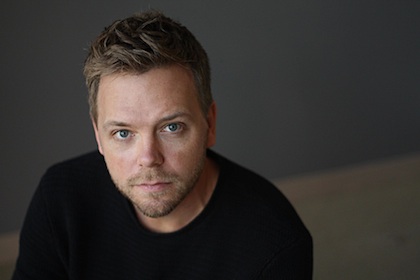 Nathan Hill’s short stories have appeared in literary journals including The Iowa Review, AGNI, The Gettysburg Review, and Fiction. A native Iowan, he now lives with his wife in Naples, Florida. The Nix, his first novel, was named #1 book of the year by Audible and Entertainment Weekly, and one of the year’s best books by The New York Times, The Washington Post, Amazon, Newsday, Library Journal, and elsewhere. It will be published worldwide in 25 languages, and is out now in hardback, eBook and audio download from Picador/Macmillan. Read more.
Nathan Hill’s short stories have appeared in literary journals including The Iowa Review, AGNI, The Gettysburg Review, and Fiction. A native Iowan, he now lives with his wife in Naples, Florida. The Nix, his first novel, was named #1 book of the year by Audible and Entertainment Weekly, and one of the year’s best books by The New York Times, The Washington Post, Amazon, Newsday, Library Journal, and elsewhere. It will be published worldwide in 25 languages, and is out now in hardback, eBook and audio download from Picador/Macmillan. Read more.
nathanhill.net
@nathanreads
Author portrait © Michael Lionstar
Mark Reynolds is a freelance editor and writer, and a founding editor of Bookanista.
@bookanista

